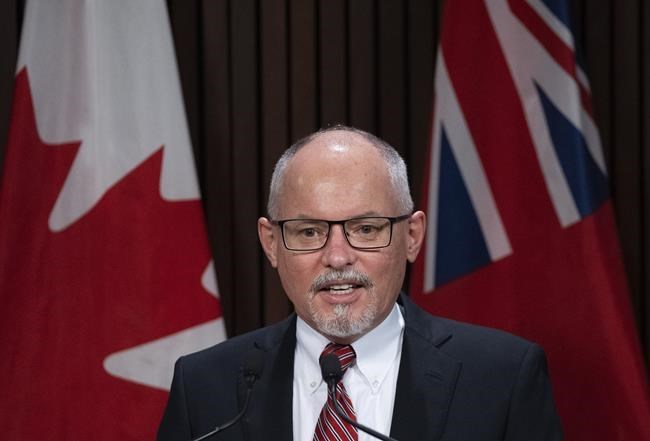TORONTO — Ontario will need to reassess the value of the vaccine certificate system in the coming weeks and months, the province's top doctor said Thursday, as he spoke of learning to live with COVID-19.
Masking will likely be the last public health measure to go, Dr. Kieran Moore said, as it offers a good amount of protection from the virus.
But with the Omicron variant so infectious and hard to control, and now that there are safe and effective vaccines as well as antiviral treatments to prevent hospitalization in high-risk individuals, it will soon be time to decide what restrictions are kept in place, he said.
"It comes to a time where we're going to have to decide how many public health measures we'll maintain going forward, and how we can try to maintain our mental, physical, social, economic and educational well-being in the face of an ongoing threat from this strain of viruses," Moore said.
"We have to decide as a society how many public health measures we want to just recommend and/or maintain in a legal fashion to limit the spread of the viruses. I think that discussion should happen soon."
Ontario should reassess the value of vaccine certificates – which show proof of two shots and are used to access venues including restaurants, gyms and cinemas – in the near future, Moore said. Two doses of a COVID-19 vaccine don't seem to significantly limit transmission of Omicron, though three doses decrease the risk of transmission by about 60 per cent, he said.
"The main benefit of the passport system now is that against severe outcomes, we are well protected with two doses, and hence increased socialization of someone unvaccinated, an increase in their risk of getting Omicron through accessing any of these venues, does increase their personal risk," Moore said.
"So it does protect the unvaccinated person well against transmission and against severe outcomes by not being able to access mass gatherings, or many of these venues.
Data from Ontario suggest that three doses of a COVID-19 vaccine can offer up to 95 per cent protection against severe illness.
Premier Doug Ford has said he is not considering updating the vaccine certificates right now to mandate three doses.
Moore also announced Thursday that the province is expanding eligibility for PCR tests to household members of health-care workers who deal directly with patients.
Ontario reported 2,797 people in hospital Thursday with COVID-19 and 541 in ICU. That's down from 2,939 hospitalizations and 555 people in intensive care the previous day.
The province also reported 74 more deaths from the virus.
There were 4,098 new COVID-19 cases reported, though Public Health Ontario has said the true number is likely higher due to testing policy changes.
The province isn't reporting data on virus cases and outbreaks in schools, but seven schools were reported closed for COVID-19 operational reasons and 261 schools reported student and staff absence rates of 30 per cent or more.
Fifty-two per cent of long-term care homes were experiencing COVID-19 outbreaks.
This report by The Canadian Press was first published Feb. 3, 2022.
Allison Jones, The Canadian Press
